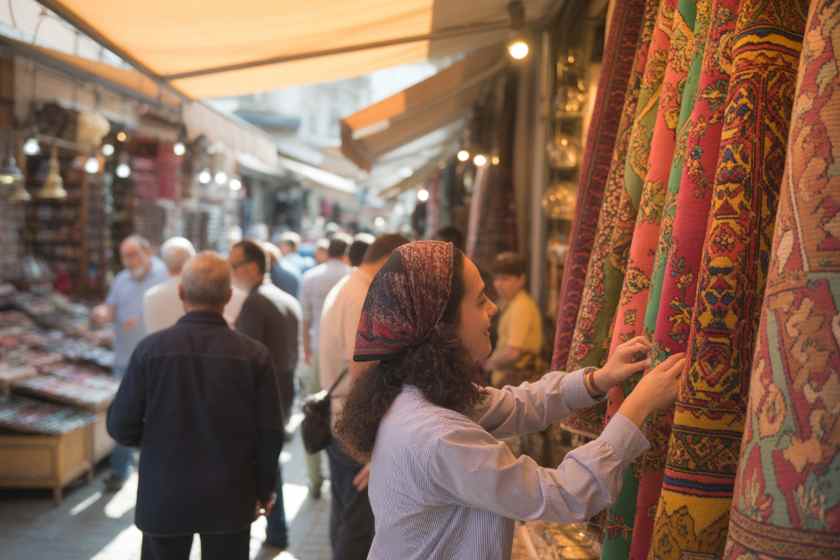Published on
August 12, 2025
Turkey’s tourism sector has experienced a slight uptick in foreign visitor arrivals in the first half of 2025, recording a 2% increase compared to the same period last year. According to official data from the Turkish Statistical Institute, the country welcomed 25.53 million tourists, a positive sign for the sector’s recovery. Alongside this increase in arrivals, overall tourism receipts also rose, showing growth in specific areas such as shopping and gastronomy tourism, though the medical tourism sector showed signs of decline.
Tourism in Turkey is continuing to evolve, with travelers increasingly prioritising shopping and culinary experiences. While medical tourism once showed promising growth, it has recently faced a decline, attributed to several economic and geopolitical factors. Despite this, shopping-related and gastronomy tourism have demonstrated strong growth, boosting Turkey’s overall tourism revenue.
Strong Growth in Shopping Tourism
One of the key drivers of tourism revenue in Turkey in the first half of 2025 has been shopping-related tourism, which saw a notable increase. Foreign visitors have shown a strong preference for retail purchases, especially in clothing, footwear, and souvenirs. This spending increase reflects the growing importance of shopping as a tourism activity in Turkey, particularly in major cities like Istanbul and Antalya, known for their vibrant shopping districts and luxury goods offerings.
The shopping tourism segment witnessed a $183 million increase in spending, reaching a total of $3.74 billion in the first half of 2025. The number of foreign arrivals with shopping as their primary travel purpose also increased by 7%, reaching 1.86 million people. This figure corresponds to 5.6% of the total foreign visitors, up from 5.4% in the previous year. The growth in shopping-related tourism highlights the increasing role that retail experiences play in attracting international visitors to Turkey, further cementing the country as a prime shopping destination in the region.
Gastronomy Tourism Gains Popularity
In addition to shopping, gastronomy tourism in Turkey has also seen a significant resurgence, with food and beverage spending rising by 15%, reaching a total of $5.43 billion in the first half of 2025. This represents an increase of $689 million compared to the same period in 2024. The rise in gastronomy tourism can be attributed to a combination of factors, including the improvement in the purchasing power of foreign visitors, currency fluctuations, and a slowdown in domestic inflation, which has made Turkey’s vibrant food scene more accessible and attractive to tourists.
Turkish cuisine, renowned for its rich flavors, diversity, and history, continues to be a major draw for tourists, with visitors seeking authentic culinary experiences across the country. From the bustling streets of Istanbul, offering everything from street food to high-end dining, to the renowned restaurants of coastal cities like Antalya and Izmir, gastronomy tourism has firmly established itself as a key segment in Turkey’s tourism industry. The share of gastronomy in total tourism revenue rose to 21.35%, up from 20% in 2024, marking its growing significance in Turkey’s overall tourism strategy.
Decline in Medical Tourism
While shopping and gastronomy tourism have flourished, Turkey’s medical tourism sector has faced a downturn. Once a rapidly growing segment of the Turkish tourism industry, medical tourism has seen a decline in both arrivals and revenue in 2025. Analysts point to factors such as exchange rate fluctuations, inflationary trends, and security concerns that may be contributing to this slowdown. Medical tourism, which includes health and wellness treatments as well as specialized medical procedures, had been a major revenue generator for Turkey in recent years. However, the shift in travel preferences has led to a decrease in the number of international patients seeking medical treatments in the country.
Despite the decline in medical tourism, Turkey remains a strong contender in global tourism, particularly in areas like shopping, gastronomy, and cultural heritage. The shift in travel preferences reflects broader trends in the tourism industry, with more travelers prioritizing experiences that offer cultural enrichment, luxury shopping, and immersive culinary adventures.
Impact of Currency and Inflation on Turkish Tourism
The fluctuations in the Turkish lira have had a significant impact on tourism spending in the country. For foreign visitors, the improved purchasing power resulting from favorable exchange rates has made both shopping and dining in Turkey more affordable. This has contributed to the increase in both shopping and gastronomy tourism revenues, as tourists are able to enjoy more luxury and culinary experiences without the burden of high costs.
The slowdown in domestic inflation has also played a role in making Turkey a more attractive destination for gastronomic tourism. With local food prices remaining relatively stable, tourists can enjoy authentic Turkish meals at a fraction of the cost they might pay in other parts of Europe or Asia. The growing interest in Turkish cuisine, coupled with favorable economic conditions for visitors, has created an environment where food and beverage spending is thriving.
The Future of Tourism in Turkey
As Turkey continues to navigate the changing dynamics of global tourism, the country’s focus on enhancing shopping and gastronomy tourism offers significant potential for continued growth. With its rich cultural heritage, unique culinary offerings, and vibrant shopping districts, Turkey remains a top destination for travelers seeking both cultural and luxurious experiences. The government’s ongoing efforts to develop tourism infrastructure and promote diverse tourism offerings are expected to keep Turkey competitive in the global tourism market.
In conclusion, Turkey’s tourism industry has shown positive growth in the first half of 2025, driven by increases in shopping and gastronomy tourism. While medical tourism has seen a decline, other sectors of the industry have managed to thrive, benefiting from factors such as exchange rate fluctuations and a growing interest in Turkish food culture. With its diverse offerings, Turkey is well-positioned to remain a leading destination for international travelers in the coming years.
